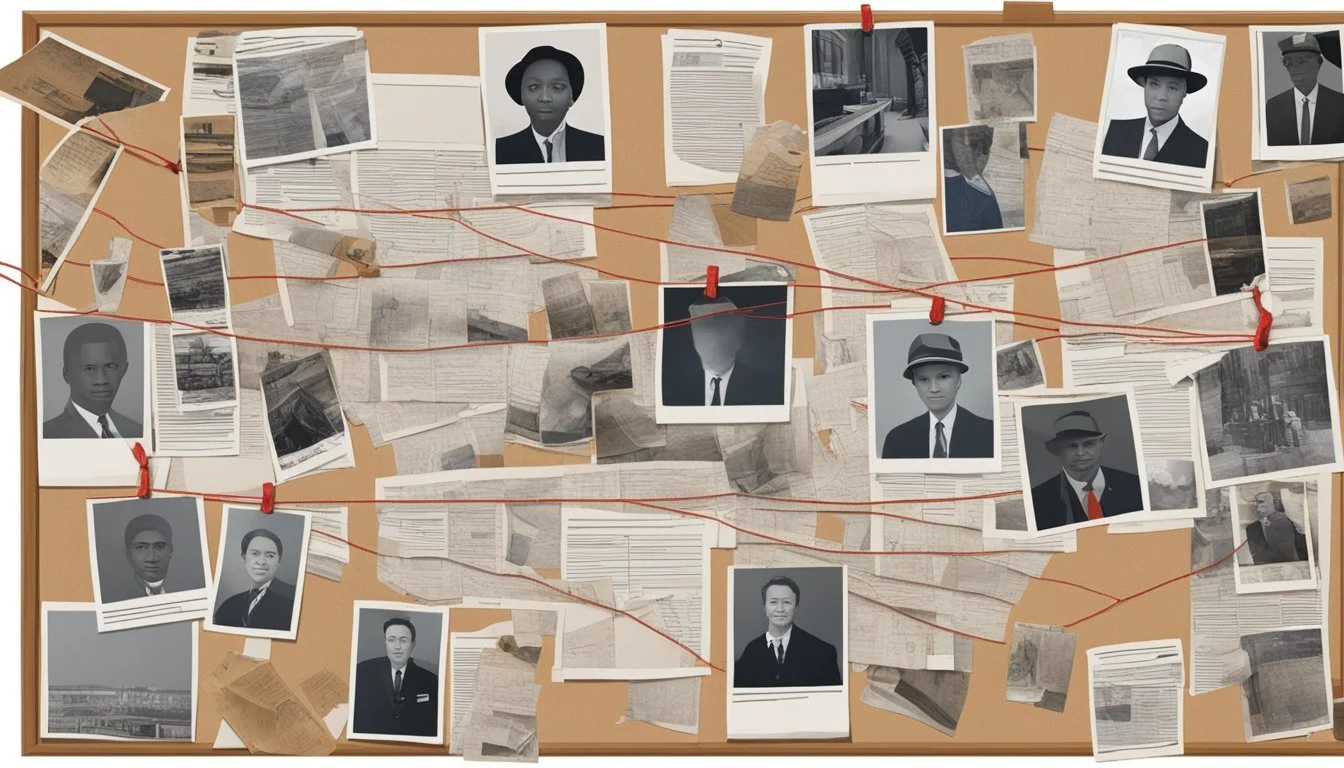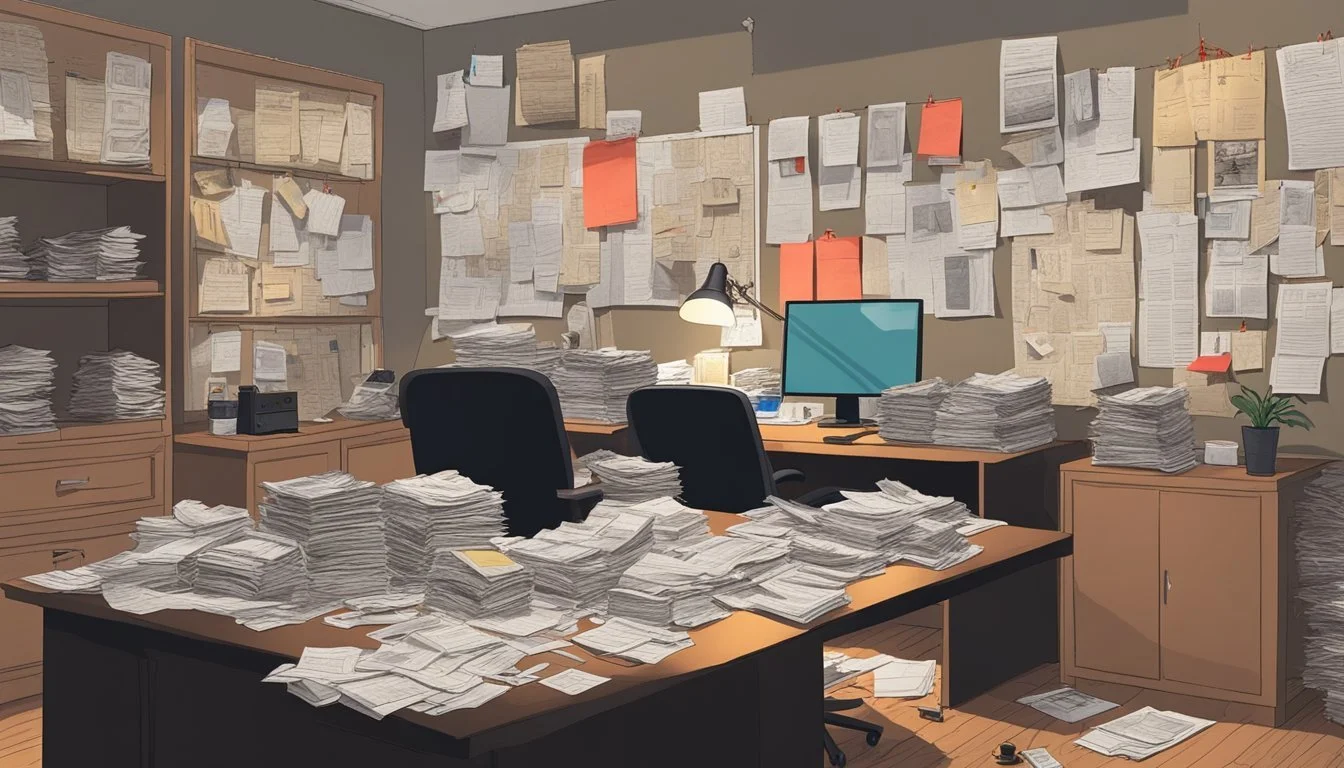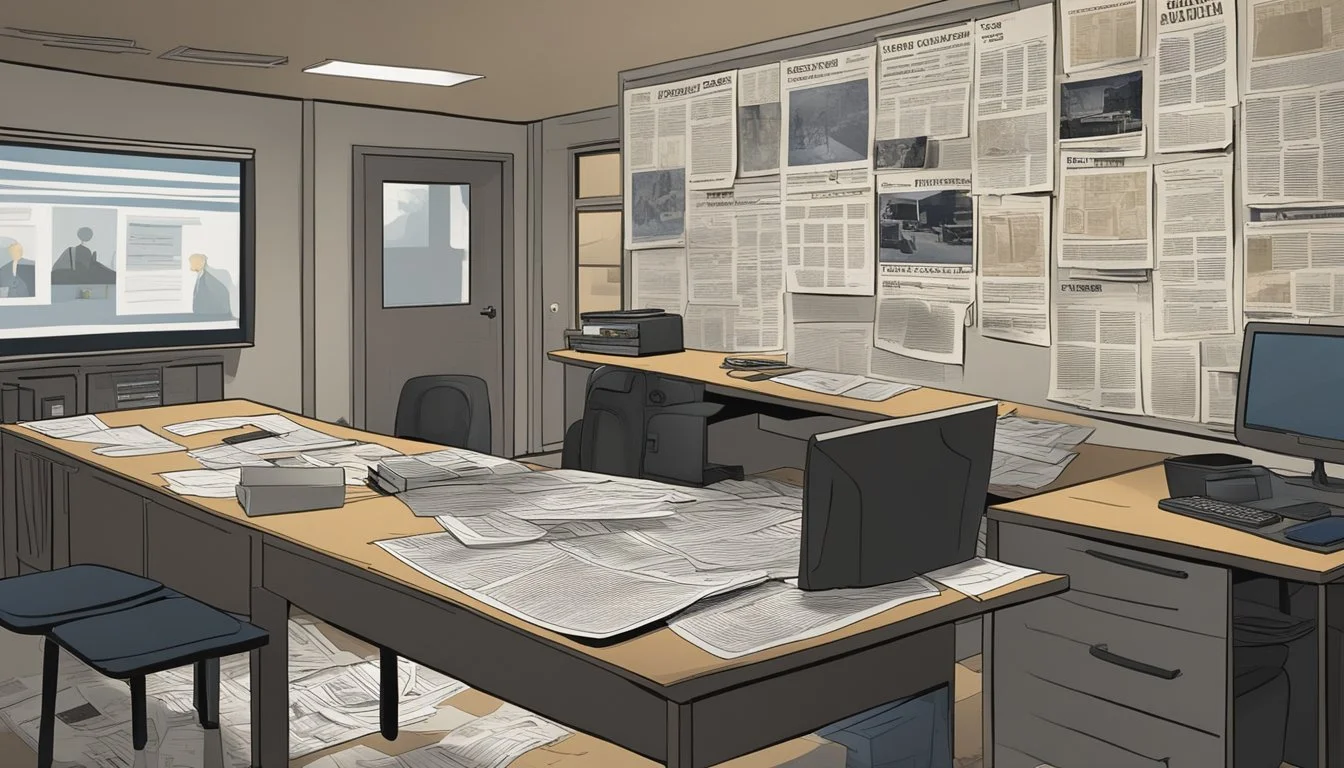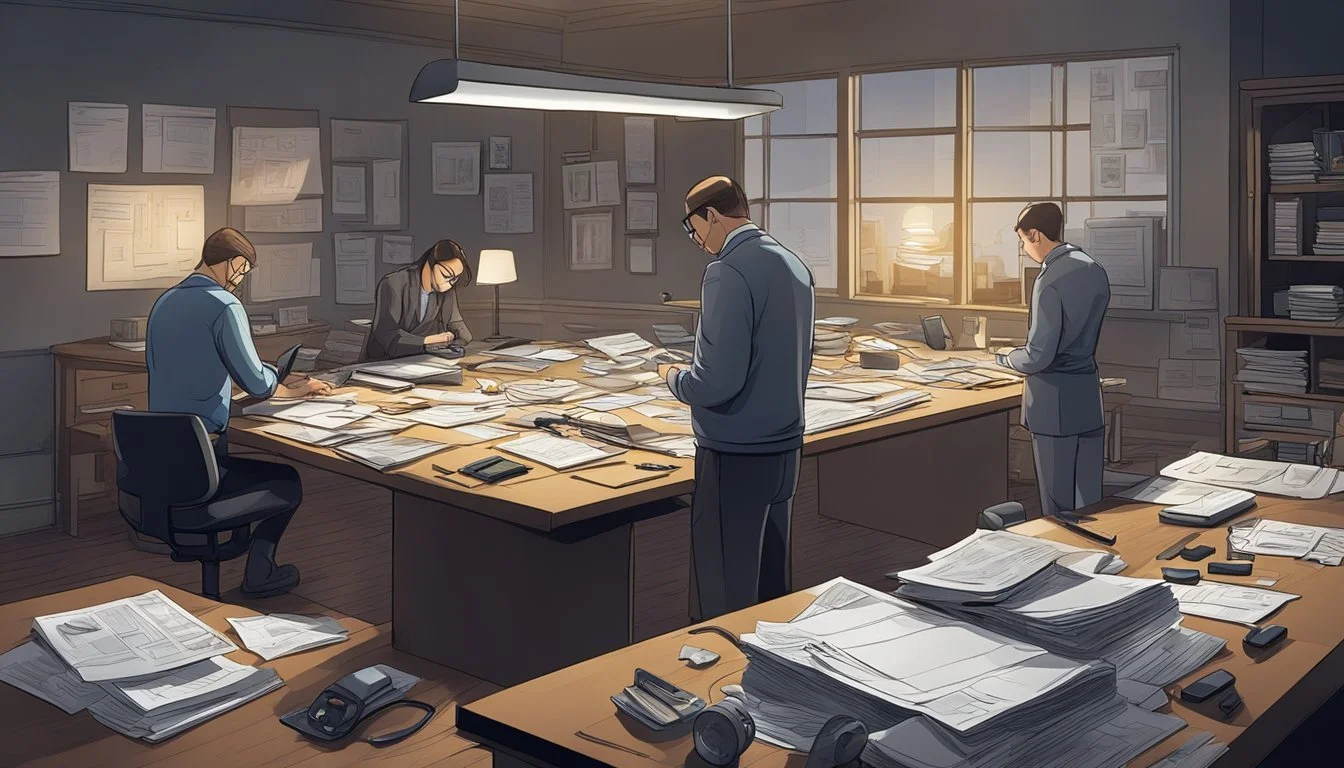10 Fascinating Documentaries on Famous Cold Case Breakthroughs
Solved Mysteries Revealed
True crime documentaries have captivated audiences with their gripping narratives and in-depth investigations of unsolved mysteries. These films shed light on cold cases that remained puzzling for years, sometimes decades, before breakthroughs finally led to resolutions. By exploring the latest forensic techniques, renewed investigative efforts, and sometimes sheer luck, these documentaries offer viewers a front-row seat to the unraveling of long-standing enigmas.
From notorious serial killers to perplexing disappearances, the world of cold case documentaries covers a wide range of criminal investigations. These films not only entertain but also educate viewers on the complexities of law enforcement work and the evolving nature of criminal justice. They often highlight the persistence of detectives, the pain of victims' families, and the impact of technological advancements in solving crimes once thought unsolvable.
1) The Disappearance of Madeleine McCann
The Netflix documentary series "The Disappearance of Madeleine McCann" explores one of the most publicized missing person cases in recent history. Directed by Chris Smith, the eight-part series premiered in 2019.
It examines the events surrounding three-year-old Madeleine McCann's vanishing from a holiday apartment in Praia da Luz, Portugal, on May 3, 2007. The documentary provides a comprehensive look at the investigation that followed.
The series features interviews with key figures involved in the case, including journalists, investigators, and locals. It delves into various theories and leads pursued over the years.
The documentary sparked renewed interest in the case, which remains unsolved to this day. It highlights the global impact of Madeleine's disappearance and the ongoing search efforts.
Critics praised the series for its thorough examination of the evidence and its portrayal of the complex nature of the investigation. The documentary serves as a compelling exploration of a case that continues to captivate public attention.
2) Cold Valley: The Case of the GRK
Cold Valley delves into the unsolved murders that shook the Lewis Clark Valley in the late 1970s and early 1980s. The two-part documentary follows Detective Jackie Nichols and Gloria Bobertz as they investigate the cold cases.
The series focuses on a string of disappearances and murders believed to be linked to a serial killer known as the Lewiston-Clarkston Valley Killer or "GRK" (Gamma Ray Killer). Five young people vanished in the area along the Washington-Idaho border between 1979 and 1982.
Detective Nichols meticulously examines old case files and evidence, hoping to uncover new leads. The documentary showcases her determination to bring closure to the victims' families after nearly four decades.
Cold Valley highlights the challenges of investigating decades-old crimes. It explores how advances in DNA technology might help solve these long-standing mysteries.
The series provides a detailed look at the original investigations and the impact of these unsolved cases on the local community. It offers viewers insight into the complexities of cold case investigations and the ongoing pursuit of justice.
3) The Staircase
"The Staircase" is a gripping documentary series that delves into the complex case of Michael Peterson. In 2001, Peterson's wife Kathleen was found dead at the bottom of their home's staircase in Durham, North Carolina.
The series follows Peterson's trial after he was charged with Kathleen's murder. It presents various theories about her death, including the possibility of an accidental fall and the controversial "owl theory."
French filmmaker Jean-Xavier de Lestrade captured the unfolding events over many years. The documentary provides an in-depth look at the American justice system and the Peterson family dynamics.
"The Staircase" gained renewed attention when additional episodes were added in 2018, covering Peterson's release from prison and subsequent Alford plea. The case remains a subject of debate among true crime enthusiasts.
The documentary's impact led to a dramatized HBO Max series in 2022, starring Colin Firth as Michael Peterson. This adaptation further explored the case's intricacies and public fascination with the mystery.
4) The Family I Had
"The Family I Had" is a gripping documentary that delves into a chilling cold case. It focuses on the story of Charity Lee, whose 13-year-old son Paris murdered his 4-year-old sister Ella in 2007.
The film explores the complex family dynamics and psychological factors that led to this tragic event. It provides a unique perspective by featuring interviews with Charity, Paris, and other family members.
Through intimate conversations and archival footage, the documentary sheds light on the lasting impact of the crime. It examines Charity's journey as she grapples with forgiveness and tries to maintain a relationship with her incarcerated son.
"The Family I Had" offers a rare glimpse into the aftermath of a horrific family tragedy. It raises thought-provoking questions about nature versus nurture, mental health, and the criminal justice system's handling of juvenile offenders.
The documentary's unflinching approach and candid interviews make it a compelling addition to the true crime genre. It serves as a poignant exploration of familial love, loss, and the complex path to healing after unimaginable trauma.
5) The Jinx: The Life and Deaths of Robert Durst
"The Jinx" is a gripping HBO documentary series that aired in 2015, focusing on Robert Durst, a wealthy real estate heir suspected of multiple murders. Directed by Andrew Jarecki, the six-part series delves into Durst's complex life and the unsolved crimes linked to him.
The documentary examines three main cases: the 1982 disappearance of Durst's first wife Kathie, the 2000 murder of his friend Susan Berman, and the 2001 killing and dismemberment of his neighbor Morris Black in Galveston, Texas.
Jarecki secured extensive interviews with Durst himself, who had previously avoided media contact. These conversations provide unprecedented insight into Durst's perspective on the events surrounding him.
"The Jinx" gained widespread attention for its shocking finale. In the last episode, Durst was caught on a hot microphone making incriminating statements, which led to his arrest just before the series concluded.
The documentary skillfully weaves together archival footage, interviews with key figures, and reenactments to present a comprehensive look at the cases. It offers viewers a chance to examine the evidence and draw their own conclusions about Durst's involvement in these notorious cold cases.
6) Casting JonBenet
Casting JonBenet offers a unique perspective on the infamous murder case of JonBenét Ramsey. This documentary takes an unconventional approach by focusing on the casting process for a fictional film about the case.
Local actors from Boulder, Colorado audition for roles as key figures in the Ramsey story. Through their performances and personal reflections, the film explores the impact of the case on the community.
The documentary delves into the various theories and speculations surrounding JonBenét's death. It showcases how different interpretations of events have shaped public perception over the years.
Casting JonBenet blends elements of true crime and artistic expression. By doing so, it encourages viewers to consider multiple perspectives on the unsolved mystery.
The film examines the cultural fascination with the case and its lasting effects on those connected to it. It raises questions about media portrayal and the nature of truth in high-profile investigations.
7) The Innocent Man
"The Innocent Man" is a compelling Netflix documentary series based on John Grisham's non-fiction book. It explores two murder cases that occurred in Ada, Oklahoma between 1982 and 1984.
The series delves into the wrongful convictions of Ron Williamson and Dennis Fritz for the 1982 murder of Debbie Sue Carter. Both men spent over a decade in prison before being exonerated by DNA evidence.
Another case featured is the 1984 murder of Denice Haraway. Tommy Ward and Karl Fontenot were convicted for this crime, despite questionable evidence and confessions.
The documentary sheds light on the flaws in the criminal justice system, including coerced confessions and unreliable witness testimonies. It raises important questions about the investigative processes used in these cases.
"The Innocent Man" premiered on Netflix in December 2018. The six-episode series combines archival footage, interviews with key figures, and reenactments to present a comprehensive look at these complex cases.
Through its in-depth examination, the documentary highlights the long-lasting impact of wrongful convictions on the accused, their families, and the community at large.
8) The Confession Tapes
The Confession Tapes is a gripping true crime documentary series that explores cases of potential false confessions leading to murder convictions. This Netflix series, which premiered in 2017, has two seasons dedicated to examining controversial cases.
Each episode focuses on a different case where individuals convicted of murder claim their confessions were coerced or involuntary. The series presents alternative perspectives on how the crimes may have occurred.
Experts in criminal law, psychology, and false confessions provide insights into the complexities of these cases. The show sheds light on the legal processes involved and the potential for miscarriages of justice.
The Confession Tapes investigates a total of 10 cases across its two seasons. It challenges viewers to consider the reliability of confessions and the factors that might lead someone to falsely admit to a crime.
This thought-provoking series contributes to the ongoing dialogue about the criminal justice system and the importance of thorough investigations. It highlights the need for careful scrutiny of confession evidence in criminal proceedings.
9) Dream/Killer
Dream/Killer is a compelling documentary that sheds light on the wrongful conviction of Ryan Ferguson. In 2005, Ferguson was sentenced to 40 years in prison for the murder of Kent Heitholt, a sports editor in Columbia, Missouri.
The film, directed by Andrew Jenks, premiered at the Tribeca Film Festival in 2015. It chronicles the tireless efforts of Ryan's father, Bill Ferguson, to prove his son's innocence and secure his release.
The documentary meticulously examines the flaws in the investigation and trial that led to Ryan's conviction. It highlights the lack of physical evidence and the reliance on questionable eyewitness testimony.
Dream/Killer played a crucial role in raising awareness about Ryan's case. The publicity generated by the film contributed to the mounting pressure on authorities to reexamine the evidence.
In 2013, after serving nearly a decade behind bars, Ryan Ferguson's conviction was overturned. The documentary's impact extended beyond this single case, sparking discussions about the broader issues of wrongful convictions and the importance of thorough investigations.
10) Trial By Media
"Trial By Media" is a Netflix documentary series that examines six high-profile court cases and their complex relationship with media coverage. The show explores how sensationalized reporting can influence public opinion and potentially impact legal outcomes.
One notable case featured in the series is the 1984 New York City subway shooting involving Bernhard Goetz. The incident sparked intense debate about self-defense, racism, and vigilantism.
The documentary also delves into other controversial cases, such as the murder of Scott Amedure. This tragic event occurred after Amedure's appearance on a tabloid talk show, raising questions about the ethics of reality TV.
"Trial By Media" provides a thought-provoking look at the intersection of journalism, entertainment, and justice. It highlights how media narratives can shape public perceptions of criminal cases.
The series offers valuable insights into the power of media representation and its potential effects on legal proceedings. It serves as a cautionary tale about the responsibilities of both journalists and consumers of news in the digital age.
Impact of Cold Case Documentaries
Cold case documentaries have profoundly shaped public perception, legal processes, and societal awareness of unsolved crimes. These films and series have become powerful tools for reigniting interest in long-forgotten cases and spurring action.
Influence on Public Perception
Cold case documentaries have transformed how the public views unsolved crimes. They humanize victims and their families, making abstract statistics deeply personal. These films often present new evidence or perspectives, challenging long-held assumptions about cases.
Documentaries like "Making a Murderer" have sparked widespread debates about the justice system. They've encouraged viewers to question official narratives and consider alternative theories.
Many cold case films employ sophisticated storytelling techniques to keep audiences engaged. This approach has made complex legal and forensic concepts more accessible to the general public.
Role in Legal Reforms
The impact of cold case documentaries extends beyond public opinion into the realm of legal reform. These films have highlighted flaws in investigative procedures and the judicial system.
Some documentaries have directly led to case reopenings or new trials. "The Thin Blue Line" famously resulted in the release of a wrongfully convicted man.
These films often expose systemic issues like racial bias, coerced confessions, and inadequate forensic practices. This exposure has prompted calls for reform in police departments and courts across the country.
Lawmakers and legal professionals increasingly recognize the power of these documentaries to shape public opinion and policy.
Raising Awareness
Cold case documentaries play a crucial role in keeping unsolved crimes in the public eye. They often generate renewed interest in cases that have gone cold for years or even decades.
These films can lead to new tips from the public, sometimes providing crucial leads for investigators. The publicity from a well-made documentary can pressure law enforcement to allocate resources to neglected cases.
Many documentaries focus on lesser-known cases, bringing attention to victims who might otherwise be forgotten. This increased visibility can be a source of comfort and hope for victims' families.
Social media engagement with these documentaries amplifies their reach, creating online communities dedicated to solving cold cases.
Challenges in Solving Cold Cases
Cold cases present unique obstacles for investigators. These challenges often hinder progress and can keep cases unsolved for years or even decades.
Technological Limitations
Older cold cases frequently suffer from a lack of advanced forensic techniques. DNA analysis, now crucial in criminal investigations, was unavailable for many historical cases. Degraded evidence may not yield usable DNA profiles with older testing methods.
Outdated databases can impede matching DNA or fingerprints to potential suspects. Many cold case units struggle to digitize old paper records and evidence logs. This makes cross-referencing information between cases difficult.
Advances in forensic technology offer new hope. Genetic genealogy has cracked previously unsolvable cases. However, applying new methods to old evidence requires significant time and resources.
Resource Constraints
Cold case units often face severe budget limitations. Many departments lack dedicated cold case teams. Detectives must balance new cases with old ones, spreading resources thin.
Time constraints pose another challenge. Reviewing extensive case files and re-interviewing witnesses demands significant manhours. Cold cases compete with active investigations for limited personnel.
Funding for new forensic tests can be scarce. Advanced DNA analysis or other specialized tests may be too costly for cash-strapped departments. This leaves potentially solvable cases in limbo.
Preservation of Evidence
Proper storage of physical evidence is critical for cold cases. Environmental factors like heat, humidity, and light can degrade biological samples over time. Improper handling may contaminate crucial evidence.
Some departments face storage space limitations. Evidence from old cases may be discarded or lost during moves or reorganizations. This can permanently close avenues of investigation.
Chain of custody issues may arise in long-unsolved cases. Tracking who handled evidence decades ago becomes difficult. This can impact the admissibility of evidence in court if a suspect is eventually identified.
Evolving Techniques in Cold Case Investigation
Technological advancements have revolutionized cold case investigations, providing new tools and methods for solving long-unsolved crimes. These innovations have dramatically increased the chances of cracking cases that were once considered impossible to solve.
Forensic Advancements
DNA analysis has become a cornerstone of modern cold case investigations. Improved techniques allow for the extraction and analysis of DNA from smaller and more degraded samples. This has led to breakthroughs in cases where evidence was previously considered insufficient.
Advanced fingerprint analysis tools now enable investigators to match partial prints and enhance degraded samples. This has resulted in new leads in cases where traditional methods failed.
Digital forensics has also emerged as a crucial tool. Investigators can now recover data from old computers, phones, and other electronic devices, potentially uncovering crucial evidence that was overlooked in the past.
Genetic Genealogy
Genetic genealogy combines DNA analysis with traditional genealogical research to identify suspects or victims. This technique has gained prominence in recent years, solving numerous high-profile cold cases.
Investigators upload DNA profiles to public genealogy databases, searching for potential relatives of the unknown individual. By building family trees and analyzing genetic connections, they can narrow down potential suspects or identify unknown victims.
This method has led to arrests in cases that remained unsolved for decades, including the identification of the Golden State Killer in 2018.
Collaboration Between Agencies
Improved communication and data sharing between law enforcement agencies have significantly enhanced cold case investigations. Centralized databases allow detectives to cross-reference information from multiple jurisdictions, potentially linking cases that were previously thought to be unrelated.
Task forces dedicated to cold cases have become increasingly common. These teams bring together experienced investigators, forensic experts, and analysts to focus solely on unsolved crimes.
Public-private partnerships have also emerged, with some agencies collaborating with universities or private labs to access cutting-edge technology and expertise.










